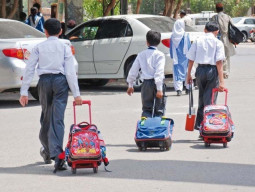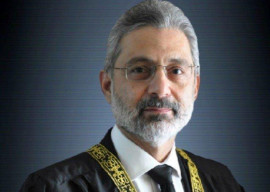
Once a bill is passed, it is sent to the governor, who gives his assent or sends the bill back to the assembly, recommending amendments. Sindh Governor Dr Ishratul Ebad, who has control over the education boards in the province, has chosen the second option and on Monday, he sent the bill back to the Sindh Assembly, saying he wants to retain his authority over the examination boards.
According to his message, he believes it is easier to maintain transparency and good governance when the provincial government has authority over the educational institutions, the bureau of curriculum and the Sindh Textbook Board, while the examinations are conducted under a separate authority. “Therefore it is expedient that he (Governor) should continue to be the controlling authority of Sindh Boards of Intermediate and Secondary Education,” read the message.
The chief ministers of all provinces, except for Sindh, have control of the education boards.
Talking to The Express Tribune, Law Secretary Ghulam Nabi Shah said that for now, the assembly has decided to defer the decision on the bill. It has two choices: either it can send the bill back to the governor, in which case the governor has no choice but to give his assent.
Or it can amend the bill in such a way that ‘both parties’ will be happy.
Officials, requesting anonymity, said that in the current volatile political scenario, the Sindh government would not want to confront the governor.
Closed schools
During the question-and-answer session, Education Minister Pir Mazharul Haq said that although Rs100 million was released to the city district government for the renovation of schools and other expenses, not a single rupee had been spent by the authorities concerned.
“During our core committee meetings, I requested the Sindh governor to direct the department to make use of the money but to no avail,” he accused.
He said that the city government is responsible for the ‘ghost’ schools and lack of furniture and other facilities in schools in different towns. “We mostly get funding from the World Bank and the European Commission and their officials have warned us that they will not give us money if it is not being utilised properly,” he said.
Haq said that the standard of education has been falling for the last nine years, especially following the promulgation of the Sindh Local Government Ordinance (SLGO).
He said that there are 1,944 boys and 675 girls primary schools in Karachi, out of which 66 have not been working since January 31, 2009. Gadap Town is at the top of this list of less-privileged areas, where 58 schools are closed. Meanwhile, SITE, Keamari, Baldia, Korangi, Landhi, Gulshan-e-Iqbal, Bin Qasim and Saddar also have at least one closed school.
Sindh Zakat and Ushr bill
The Sindh Assembly unanimously passed the Sindh Zakat and Ushr Bill.
The bill was moved by Sindh Law Minister Ayaz Soomro.
After the promulgation of the 18th Amendment, Zakat and ushr have been handed over to the provincial governments, said Soomro.
In order to ensure better assessment, collection and disbursement of alms in the province, it is important to enact the law at the provincial level and to repeal the provisions of the federal law that have to do with Sindh.
Under this law, the government would establish a Sindh Zakat Council, which would consist of a chairman, five persons, of which three shall be ulema and two women who shall not be less than 35 years of age. Secretaries of finance, local government, health, education, social welfare and zakat and ushr departments would also be members.
A retired judge of the Sindh High Court would be appointed the chairman.
The council will have committees in each district and in Karachi, there will be five district committees.
MPA Arif Mustafa Jatoi of the National Peoples Party (NPP) proposed several amendments to the bill, only one of which was accepted and consequently, the word collector [used in the bill] was replaced by EDO/Collector.
Other issues
Pakistan Muslim League-F MPA Nusrat Saher Abbasi said that Iran had sent 92 containers carrying different kinds of items, including blankets and ration, but despite a lapse of one-and-half months, the government has not cleared the containers from the port.
Mazharul Haq appreciated the role of the Iranian government and assured Abbasi that they would talk to the federal government and have the relief goods cleared very soon.
Meanwhile, the Sindh Assembly extended the date of submission for the report of the standing committee on home regarding the law and order situation in Sindh, following the request of MPA Anwar Mahar, who is the chairman of the committee.
Published in The Express Tribune, January 18th, 2011.




































COMMENTS
Comments are moderated and generally will be posted if they are on-topic and not abusive.
For more information, please see our Comments FAQ